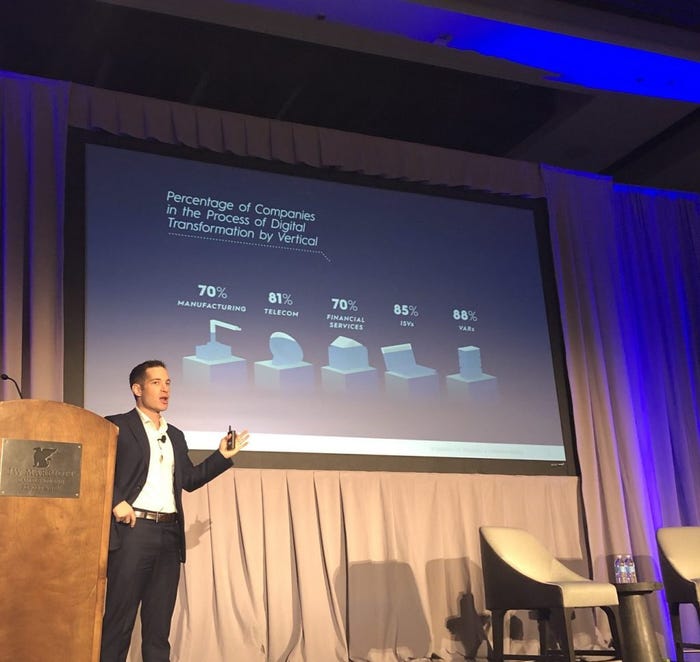AppDirect's Saks Addresses Post-WTG Acquisition Needs, Successes
It's new technological territory for WTG partners and their customers.

WTG subagents are adopting new technologies following AppDirect’s acquisition of the master agent.
AppDirect founder and Co-CEO Daniel Saks told a partner audience Friday that he’s excited to see them adding Google Apps, IBM MaaS360 and other offerings to their portfolios. He encouraged them to take advantage of AppDirect’s support and expertise as they sell and implement cloud or IT-focused services.
“What I’ve heard from many of you is that you’re really good at selling certain services, and you don’t want to dilute that expertise by starting to say, ‘OK, now I can sell everything under the sun.’ And we hear you, and we think that’s super important,” Saks said.

AppDirect’s Dan Saks
AppDirect brought team members from its AppHelp IT help desk unit to meet partners at WTG’s Tee & Sea event in Scottsdale, Arizona. The e-commerce platform company is making AppHelp and monthly collaborative sessions and webinars available to WTG subagents. The goal is to “turbo boost” their businesses and meet demand for more presale resources.
“What I’ve heard from the community too is that we have a little bit of work to do to help train and enable you to have those conversations and also enable you to think through unique ways to ‘merchandize’ these service offerings,” he said.
AppDirect bought WTG last year and moved it into its new AppSmart unit, which contains also-purchased NeoCloud. As Saks has told Channel Futures, he hopes WTG’s agents will function as the human face for AppDirect’s technology platform. Partners are a necessary sales force in Saks’ mind. He has noted multiple times at industry events that AppDirect’s 10-year-history taught him the undeniable value of human relationships in the technology industry.
“One of the key observations we saw was, [the companies that] enabled the agent channels were the most effective at selling and succeeding,” he said.
Channel partners have earned trust from longstanding relationships with customers — enough trust to lead them into and through digital transformation initiatives such as transitioning from MPLS to SD-WAN.
The task requires trust because of its complexity. It’s not simply a matter of buying a more advanced technology, but moving services from hosted environments into public environments.
“As the transformation evolves, there needs to be more support and more handholding, because people aren’t starting from scratch,” Saks said. “They’re actually needing to migrate services from one place to another, and that’s where your support can become even more beneficial and helpful.”
Saks shared data from AppDirect’s Digital Economy Report, which highlighted noticeable differences between verticals with regard to embracing and adopting sweeping technological changes.
The shared value between industries is the importance of digital transformation. The vast majority (79 percent) of businesses responding to the study are going through the process, and the majority of companies in each vertical listed were engaged in transformation efforts.
But there are clear disparities.
Manufactured and financial services trail at 70 percent engaged, behind …
… telecom (81 percent), ISVs (85 percent) and VARs (88 percent). The report took answers from nearly 500 executives from companies that have 100 or more employees.

Scottsdale, Arizona, March 8: Daniel Saks shares information from the AppDirect Digital Economy Report.
Verticals also come with different problems. Manufacturing struggles to overcome a fundamental clash of cultures.
“For them it’s about this idea that historically they never saw themselves as software companies,” Saks said. “They really saw their need for IT as limited.”
While manufacturing has a culture problem, financial service institutions need to build existing systems instead of buying new ones. Telecommunications companies face the expensive upgrade of legacy systems, and ISVs have a short budget. These differences underscore the importance of consulting.
“What we’ve seen is that a horizontal approach won’t work. You need to think through your client’s solutions and pain points,” he said.
But take comfort in that, Saks said. The traditional agent channel should be best positioned to identify and address unique pain points. Its longstanding relationships give it a head start over hot, new born-in-the-cloud competition.
“Because you’ve known your customers many many years, you actually have the ability to earn their trust and have this conversation in a much more meaningful way than someone calling from an ISV like Google,” Saks said.
The nuance extends yet another level. Companies within a vertical differ significantly on a personnel basis. When more of a company benefits from new technology, you may find several squeaky wheels clamoring for attention within a single customer account. Different business units want to buy different technologies. Consultancy becomes key once again as customers struggle to take a unified approach.
“What used to be seen as a very clean and easy transformation now has many different avenues and competing streams. So even within a medium-size organization, there may be different initiatives being driven by different product owners or different functional groups. There might be a back-office CRM transformation,” Saks said.
Saks advised WTG subagents to identify prospective customers’ “digital champions.” If you properly envision them, executives who are passionate about implementing your technology will drive more buy-in than you ever could.
“It could be the CEO; it could be the head of IT. It could be the product owner. It could be a chief digital officer,” Saks said. “Figuring out who these people are and equipping them with the data and insights to actually drive this change internally is a huge driver to your pwn success as well.”
Saks co-founded AppDirect with Nicolas Desmarais and Andy Sen in 2009. Read our recap of WTG’s December holiday event to learn why AppDirect and WTG chose each other as M&A partners.
Read more about:
AgentsAbout the Author(s)
You May Also Like


